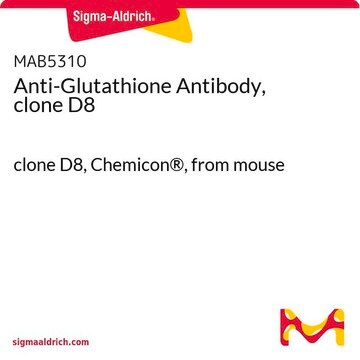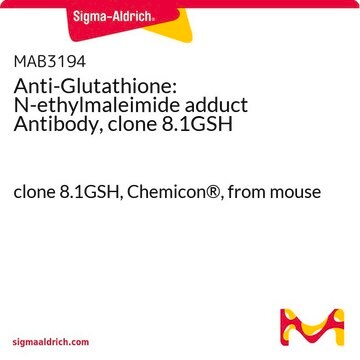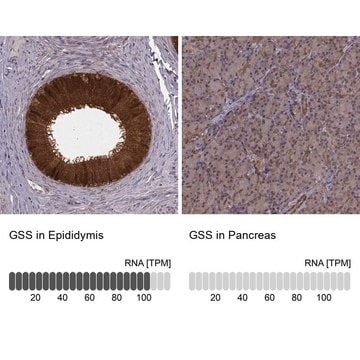AB5010
Anti-Glutathione Antibody, detects both GSH & GSSG
Chemicon®, from rabbit
Přihlásitk zobrazení cen stanovených pro organizaci a smluvních cen
About This Item
UNSPSC Code:
12352203
eCl@ss:
32160702
NACRES:
NA.41
Doporučené produkty
biological source
rabbit
Quality Level
antibody form
purified immunoglobulin
antibody product type
primary antibodies
clone
polyclonal
species reactivity
eukaryotes
manufacturer/tradename
Chemicon®
technique(s)
immunohistochemistry: suitable
shipped in
wet ice
target post-translational modification
unmodified
Gene Information
human ... GSS(2937)
Specificity
Glutathione. The antibody has been calibrated against a spectrum of antigens to assure hapten selectivity and proper affinity. No measurable glutaraldehyde-fixed tissue cross-reactivity (<1:1000) against L-alanine, g-aminobutyrate, 1-amino-4-guanidobutane (AGB), D/L-arganine, D/L-aspartate, L-citrulline, L-cysteine, D/L-glutamate, D/L-glutamine, glycine, L-lysine, L-ornithine, L-serine, taurine, L-threonine, L-tryptophan, L-tyrosine. Does not discriminate between free GSH and GSSG.
Immunogen
Epitope: detects both GSH & GSSG
Glutathione-glutaraldehyde
Application
Immunohistochemistry using silver-intensified immunogold or enhanced fluorescence methods. Treatment with autofluorescent reducers is typically necessary when using glutaraldehyde fixatives. Samples should be fixed with 0.2% - 2.5% glutaraldehyde for optimum detection. See notes technical notes. This antibody has also been used and found to work with a zero-low glutaraldehyde / high paraformaldehyde fixation (4% paraformaldehyde in 0.1M phosphate buffer / 3% sucrose fixative ). The minimum glutaraldehyde concentration for AB5010 is 0.02%. Performance is good with frozen sections, Vibratome sections and tissue culture formats, when penetrating reagents such as 0.3% Triton X-100 are used (only in blocking buffer, antibody dilution buffer should be in simple TBS or PBS only).
Western blot (Mawatari and Murakami, 2004).
Optimal working dilutions must be determined by the end user.
Note: Glutathione is not osmium tolerant and therefore should not be used for post-embedding electron micoscope immunohistochemistry.
All procedures may be carried out at room temperature. Though the exact dilutions for all applications can not be predicated, it is unlikely that deviations from the calibrated concentration will be needed. The 100X dilution is calibrated to optimize the detection of antigen levels over a 2 log unit range. Greater or lesser dilutions may be employed if unusually high (>20 mM) or low (<0.2 mM) intracellular hapten levels are anticipated or novel specimen conditions exist, such as low glutaraldehyde levels or unusual embedding protocols. Greater dilutions will likely result in decreased maximum signal strength whereas more concentrated solutions will compress the dynamic range of detection.
TECHNICAL NOTES
The AB5010 is optimized for use with immunogold or fluorescence detection. Visualization with enzyme-linked methods can be used but they typically compress the dynamic range of detection. Use of high gain methods such as tyramides will require the user to perform independent calibrations. Use with frozen sections is possible but will not yield optimal images as IgGs will penetrate aldehyde cross-linked tissue poorly and most amino acids are present at such high levels that prozone effect occurs. Use in whole mount or vibratome sections is not recommended for similar reasons.
Western blot (Mawatari and Murakami, 2004).
Optimal working dilutions must be determined by the end user.
Note: Glutathione is not osmium tolerant and therefore should not be used for post-embedding electron micoscope immunohistochemistry.
All procedures may be carried out at room temperature. Though the exact dilutions for all applications can not be predicated, it is unlikely that deviations from the calibrated concentration will be needed. The 100X dilution is calibrated to optimize the detection of antigen levels over a 2 log unit range. Greater or lesser dilutions may be employed if unusually high (>20 mM) or low (<0.2 mM) intracellular hapten levels are anticipated or novel specimen conditions exist, such as low glutaraldehyde levels or unusual embedding protocols. Greater dilutions will likely result in decreased maximum signal strength whereas more concentrated solutions will compress the dynamic range of detection.
TECHNICAL NOTES
The AB5010 is optimized for use with immunogold or fluorescence detection. Visualization with enzyme-linked methods can be used but they typically compress the dynamic range of detection. Use of high gain methods such as tyramides will require the user to perform independent calibrations. Use with frozen sections is possible but will not yield optimal images as IgGs will penetrate aldehyde cross-linked tissue poorly and most amino acids are present at such high levels that prozone effect occurs. Use in whole mount or vibratome sections is not recommended for similar reasons.
Research Category
Neuroscience
Neuroscience
Research Sub Category
Oxidative Stress
Oxidative Stress
This Anti-Glutathione Antibody, detects both GSH & GSSG is validated for use in IH for the detection of Glutathione.
Packaging
sufficient for 2000 assays
Physical form
Format: Purified
IgG fraction in sterile 0.1M phosphate buffer. No preservative
Storage and Stability
Maintain stock at 2-8°C in undiluted aliquots for up to 6 months. This stock is extremely stable under normal use and routine storage at 2-8°C. Do not refreeze this stock.
Legal Information
CHEMICON is a registered trademark of Merck KGaA, Darmstadt, Germany
Disclaimer
Unless otherwise stated in our catalog or other company documentation accompanying the product(s), our products are intended for research use only and are not to be used for any other purpose, which includes but is not limited to, unauthorized commercial uses, in vitro diagnostic uses, ex vivo or in vivo therapeutic uses or any type of consumption or application to humans or animals.
Ještě jste nenalezli správný produkt?
Vyzkoušejte náš produkt Nástroj pro výběr produktů.
Osvědčení o analýze (COA)
Vyhledejte osvědčení Osvědčení o analýze (COA) zadáním čísla šarže/dávky těchto produktů. Čísla šarže a dávky lze nalézt na štítku produktu za slovy „Lot“ nebo „Batch“.
Již tento produkt vlastníte?
Dokumenty související s produkty, které jste v minulosti zakoupili, byly za účelem usnadnění shromážděny ve vaší Knihovně dokumentů.
Jie Yang et al.
The Journal of biological chemistry, 295(24), 8302-8324 (2020-04-26)
Heat shock protein 70 (Hsp70) proteins are a family of ancient and conserved chaperones. Cysteine modifications have been widely detected among different Hsp70 family members in vivo, but their effects on Hsp70 structure and function are unclear. Here, we treated
Katarzyna Otulak-Kozieł et al.
International journal of molecular sciences, 23(19) (2022-10-15)
Plants produce glutathione as a response to the intercellular redox state. Glutathione actively participates in the reactive oxygen species (ROS)-dependent signaling pathway, especially under biotic stress conditions. Most of the glutathione S-transferases (GSTs) are induced in cells during the defense
Glutathione Contribution in Interactions between Turnip mosaic virus and Arabidopsis thaliana Mutants Lacking Respiratory Burst Oxidase Homologs D and F.
Otulak-Kozie??, et al.
International Journal of Molecular Sciences, 24 (2023)
Zhouping Hong et al.
The Journal of biological chemistry, 299(1), 102723-102723 (2022-11-22)
Hsp70s are multifunctional proteins and serve as the central hub of the protein quality control network. Hsp70s are also related to a number of diseases and have been established as drug targets. Human HspA1A (hHsp70) and HspA8 (hHsc70) are the
Single-cell redox imaging demonstrates a distinctive response of dopaminergic neurons to oxidative insults.
Horowitz, MP; Milanese, C; Di Maio, R; Hu, X; Montero, LM; Sanders, LH; Tapias, V; Sepe et al.
Antioxidants & Redox Signaling null
Náš tým vědeckých pracovníků má zkušenosti ve všech oblastech výzkumu, včetně přírodních věd, materiálových věd, chemické syntézy, chromatografie, analytiky a mnoha dalších..
Obraťte se na technický servis.






